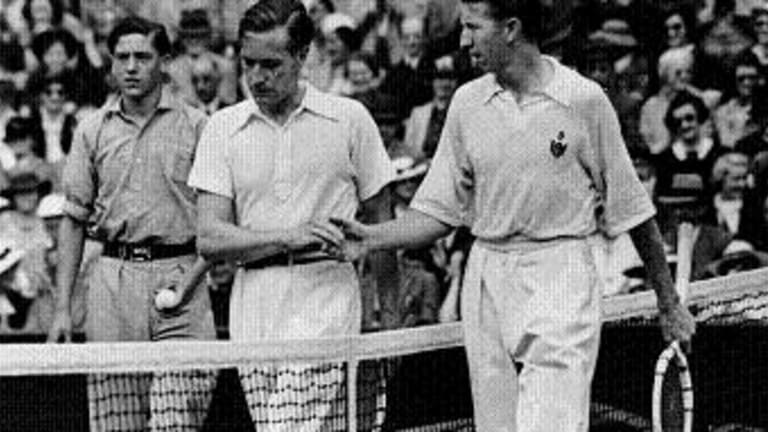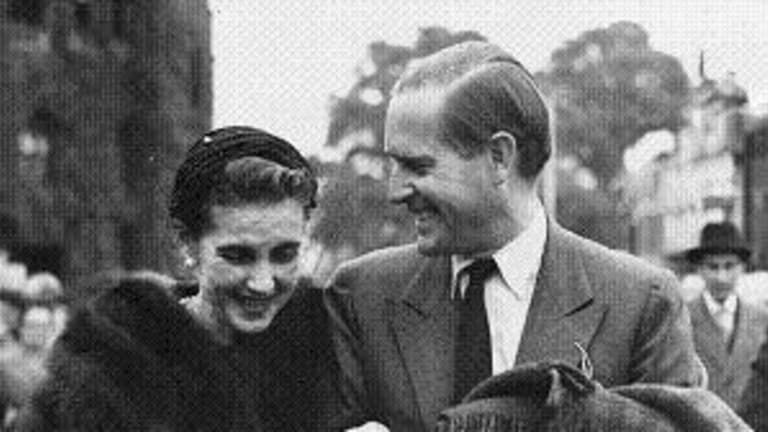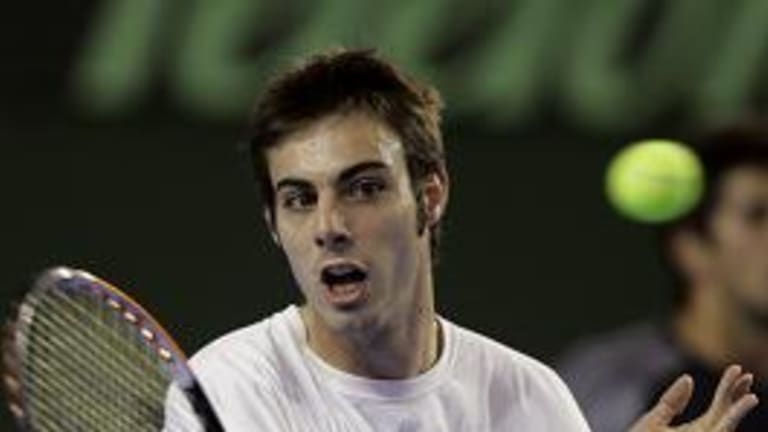In any event, that critical fifth rubber ultimately was hailed and often referred to as "the greatest tennis match ever played", and for a variety of reasons, starting with the level of play. But there was also this little matter of the telephone call von Cramm allegedly received from Adolph Hitler just as the players were ready to take Wimbledon's Centre Court on that fateful July day (Wimbledon hosted the Interzone final under the system in place at the time). But don't jump to conclusions: it was widely known that von Cramm loathed the Nazi regime and its machinations, a fact that only made the anecdote more potent, and portentious.
The world was on the brink of World War II at the time, yet the official flag of the Third Reich - red and white, with a black with a swastika at the center - flew above Centre Court, along with the stars and stripes (and, I presume, the Union Jack). There was, in fact, a great deal of admiration among upper-crust Brits for the Nazi cause and leadership, just as there would be a few decades later for the Soviet Communist overlords after the Berlin wall went up and the world drifted into the Cold War (the name Kim Philby ought to ring a bell). I mention these elements because they provide a hint of the context brought to life (with seemingly unflagging accuracy and impeccable research) in A Terrible Splendor, and because they help illuminate the task that lay before chocolate milk-shake and jazz loving, borderline goofy-looking Don Budge.
Like many of you, I'd heard bits and pieces about the match as well as the context in which it was played, but one of the first things that struck me as I read the book was that I really didn't know very much about that match, never fully grasped the significance of the context, or recognized the pressure upon the principals - von Cramm, as an unwilling but de facto representative of Aryan supremacy, Budge as the green kid dispatched to the job of a grizzled veteran. Greatest match of all time? I shrugged; to each his own, right? But in my own mind I got hung up on the fact that it wasn't even a Davis Cup final, and that von Cramm's resume doesn't exactly put him in the company of Budge (who soon would record the first tennis Grand Slam), Bill Tilden, Rene LaCoste, Rod Laver, Pete Sampras, Roger Federer. . .
Now I'm thinking that I really missed something all these years, and while we saw a pretty good little match at Wimbledon last July, there's plenty of room for discussion on this "greatest" subject - and resolution isn't even necessary.
Anyway, this book will blow many readers away, although it left me kind of bummed out contemplating the Davis Cup final coming up this weekend. There's no point extolling one generation at the expense of another; times change sufficiently to make generational comparisons an exercise best begun and ended on a couple of barstools. But there's also no doubt that despite the enormous advances of the Open era, tennis in general and Davis Cup in particular no longer rouse passions and excite curiosity the way they once did. It's counter-intuitive, but the more I read about some of the towering players and events of the past, the more it seems that the tennis players were stars of a greater magnitude. Open era be danged - the real heyday of tennis players as rock stars may have been in that era framed by the careers of Bill Tilden and Jack Kramer.
If that's true, it may be less a comment on some theoretical decline in the prestige of the game than on changing times. The world was simpler then, with a limited radar screen of public interest, and a much smaller pool of those exceptional individuals (like Babe Ruth, or the horse, Seabiscuit) capable of transcending their sport to grip the imagination of a worldwide audience.
I can think of a number of Davis Cup ties, featuring the likes of John McEnroe, Stan Smith, Boris Becker, Mats Wilander, Ilie Nastase, Andre Agassi that, if played in a context comparable to Budge-von Cramm, might have loomed far more significant, and attained a comparable resonance. But what are you going to do, set the world on fire to help a Davis Cup match transcend its most immediate and obvious context? By the same token, the Budge-von Cramm match might be an obscure and largely forgotten clash today, had it not also been fought out agains so dramatic a geo-political backdrop. One thing, though, is for sure - the match was played at an extraordinarily high level, on wickedly tense and evenly-matched terms.
I don't know if Spain vs. Argentina this weekend will produce anything like the drama of that 1937 USA vs. Germany clash, even as a mere tennis spectacle; Rafael Nadal's withdrawal seems to have put the kaibosh on that. The fact that Argentina is vying to shed its reputation as the best nation never to win the Cup still gives the crippled event a measure of specific gravity, but it also hurts this final that none of the players involved is a transcendent international star on the order of Nadal, Federer, or many of the men mentioned above. I may be underestimating the degree of enthusiasm for this tie, sitting on the sidelines here in New York, but I don't get a strong sense that there are a lot of sweaty palms anywhere beyond the outlying suburbs of Buenos Aires, and I personally don't feel that cool breeze that heralds the gathering of a massive storm as this tie approaches. Perhaps our friends in Argentina or Spain can correct this misconception, if that's what it is.


